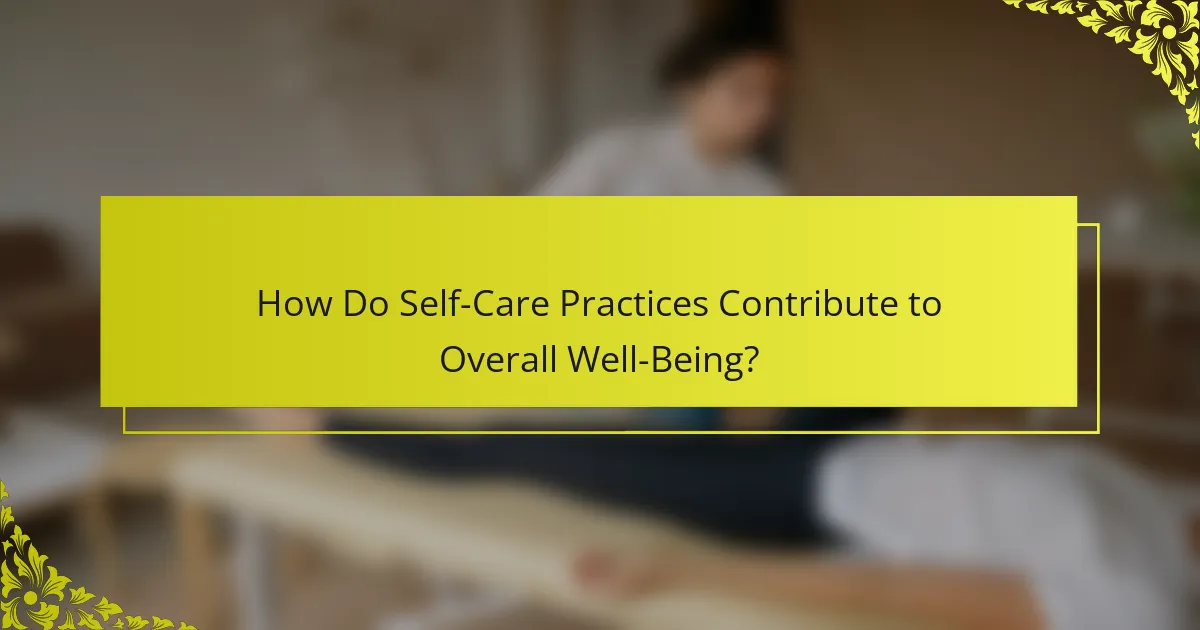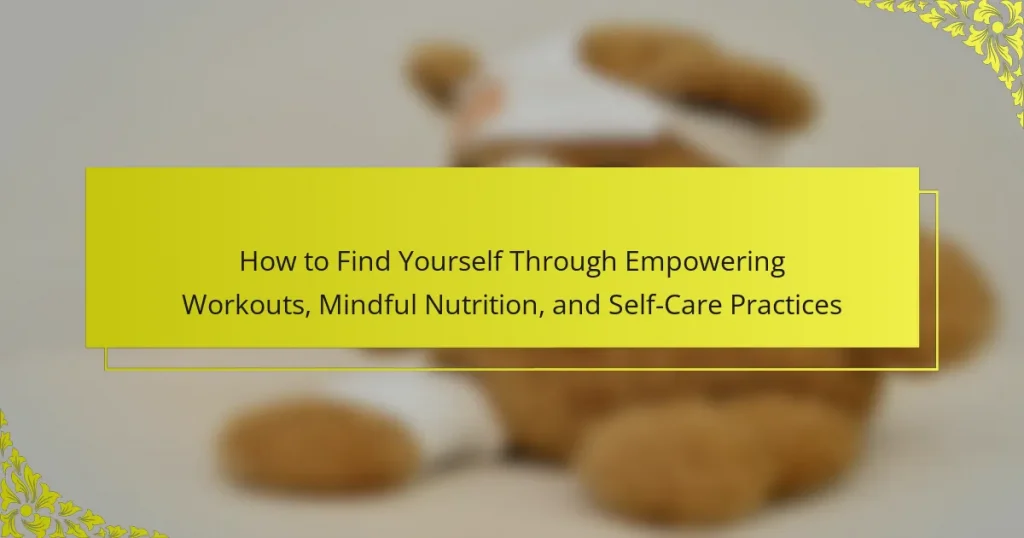Finding empowerment through fitness and nutrition can transform your well-being. This article explores how empowering workouts build strength and resilience, mindful nutrition enhances health, and self-care practices promote emotional balance. By integrating these elements, women can create a holistic approach to personal growth and wellness. Prioritising these strategies leads to sustainable health benefits and improved quality of life.

What are Empowering Workouts and How Do They Impact Women’s Health?
Empowering workouts enhance women’s health by promoting physical strength, mental resilience, and emotional well-being. These workouts focus on building confidence through challenging exercises that foster a sense of achievement. Studies show that women who engage in empowering workouts report higher self-esteem and reduced anxiety levels. Mindful nutrition complements these workouts by providing essential nutrients that support energy levels and recovery. Self-care practices further enhance overall health by encouraging stress management and fostering a positive body image. Together, these elements create a holistic approach to women’s health that emphasizes empowerment and personal growth.
What Types of Workouts Are Considered Empowering?
Empowering workouts include high-intensity interval training, strength training, yoga, and dance. These workouts enhance physical strength, boost confidence, and promote mental well-being. High-intensity interval training, for example, can improve cardiovascular health and increase endurance. Strength training builds muscle and supports bone density, while yoga fosters mindfulness and flexibility. Dance workouts encourage self-expression and creativity, contributing to overall empowerment.
How Can Strength Training Boost Confidence?
Strength training can significantly boost confidence by enhancing physical strength, improving body image, and fostering a sense of accomplishment. Regular workouts lead to measurable improvements in fitness, which can translate to greater self-esteem. As individuals set and achieve fitness goals, they experience a psychological boost that reinforces their self-worth. Additionally, the discipline required for strength training cultivates resilience and determination, further enhancing confidence in various life areas.
What Role Does Cardiovascular Exercise Play in Mental Well-Being?
Cardiovascular exercise significantly enhances mental well-being by reducing anxiety and depression. Engaging in regular aerobic activities, such as running or cycling, triggers the release of endorphins, which are natural mood lifters. Studies show that individuals who participate in consistent cardiovascular workouts report improved emotional resilience and cognitive function. Additionally, these exercises promote better sleep patterns, further contributing to overall mental health. By integrating cardiovascular workouts into a self-care routine, individuals can empower themselves and foster a positive mindset.
How Do Empowering Workouts Foster a Sense of Community?
Empowering workouts foster a sense of community by encouraging collaboration and support among participants. These workouts often promote shared goals, creating bonds as individuals work together to achieve fitness milestones. Group classes and team challenges enhance social interaction, making exercise a collective experience. Additionally, the positive atmosphere cultivated in these settings encourages motivation, accountability, and lasting friendships, reinforcing the community aspect.

What is Mindful Nutrition and Why is it Important for Women?
Mindful nutrition is a conscious approach to eating that emphasizes awareness of food choices and their effects on health. It is important for women as it supports physical health, emotional well-being, and fosters a positive relationship with food. By practicing mindful nutrition, women can enhance self-awareness, reduce stress, and improve overall wellness. This approach encourages listening to the body’s hunger cues and making informed food choices that align with personal values and health goals.
How Can Mindful Eating Practices Improve Physical Health?
Mindful eating practices can significantly enhance physical health by promoting better digestion, weight management, and improved nutrient absorption. By focusing on the eating experience, individuals become more aware of their hunger cues and food choices. This awareness fosters healthier eating habits, which can lead to reduced risk of chronic diseases. Research indicates that mindful eating can lower stress levels, contributing to overall well-being. Engaging in this practice encourages a balanced relationship with food, enhancing both mental and physical health.
What Are the Key Principles of Mindful Nutrition?
Mindful nutrition emphasizes awareness and intentionality in food choices. Key principles include recognizing hunger cues, savoring each bite, and choosing whole, nutrient-dense foods. This approach fosters a deeper connection with food, promotes better digestion, and supports emotional well-being. By focusing on the experience of eating, individuals can cultivate a healthier relationship with food, leading to sustainable habits.
How Does Mindful Nutrition Support Emotional Balance?
Mindful nutrition supports emotional balance by promoting awareness of food choices and their effects on mood. This approach encourages individuals to select nutrient-rich foods that enhance well-being. Studies indicate that diets high in fruits, vegetables, and whole grains can reduce anxiety and depression. Additionally, mindful eating practices foster a positive relationship with food, helping individuals recognize emotional triggers related to eating. As a result, this awareness can lead to healthier habits and improved emotional resilience.
What Nutrients Are Essential for Women’s Health?
Essential nutrients for women’s health include iron, calcium, folate, omega-3 fatty acids, and vitamin D. These nutrients support reproductive health, bone density, and overall well-being. Iron is crucial for preventing anaemia, while calcium and vitamin D are vital for bone health. Folate supports fetal development during pregnancy, and omega-3 fatty acids contribute to heart health. Prioritising these nutrients through mindful nutrition enhances women’s health and empowerment.

How Do Self-Care Practices Contribute to Overall Well-Being?
Self-care practices significantly enhance overall well-being by promoting mental, emotional, and physical health. Engaging in empowering workouts boosts endorphin levels, reducing stress and anxiety. Mindful nutrition nourishes the body and supports cognitive function, leading to improved mood and energy. Regular self-care routines foster resilience, helping individuals better cope with life’s challenges. As a result, a holistic approach to self-care can transform one’s quality of life.
What Are Effective Self-Care Strategies for Women?
Effective self-care strategies for women include empowering workouts, mindful nutrition, and holistic self-care practices. Engaging in regular physical activity enhances mental and emotional well-being. Mindful nutrition focuses on consuming whole foods that nourish the body, promoting energy and vitality. Incorporating self-care practices, such as meditation and journaling, fosters a deeper connection with oneself. Prioritising these strategies can lead to improved self-awareness and overall health.
How Can Journaling Enhance Self-Reflection?
Journaling enhances self-reflection by promoting clarity of thought and emotional processing. It allows individuals to articulate feelings, track personal growth, and identify patterns in behaviour. This practice can lead to increased self-awareness and improved mental well-being. Regular journaling can also serve as a unique tool for mindfulness, encouraging presence and focus on the current moment. As a result, it empowers individuals to make informed decisions aligned with their values and goals.
What Role Does Sleep Play in Self-Care?
Sleep is essential for effective self-care, as it restores energy and enhances mental well-being. Quality sleep improves cognitive function, mood regulation, and stress management. Research shows that adults need 7-9 hours of sleep per night to optimize health. Inadequate sleep can lead to fatigue, irritability, and decreased motivation for self-care practices. Prioritising sleep supports overall wellness, enabling better engagement in empowering workouts and mindful nutrition.
How Can Women Create a Personalized Self-Care Routine?
Women can create a personalized self-care routine by integrating empowering workouts, mindful nutrition, and self-care practices tailored to their needs. Start by identifying personal fitness goals, such as strength building or stress relief, and choose workouts that resonate with those objectives. Incorporate nutritious foods that support energy levels and overall health, focusing on whole, unprocessed options. Establish a self-care schedule that includes activities like meditation, journaling, or nature walks to promote mental well-being. Regularly reassess and adjust the routine to ensure it remains aligned with evolving personal goals and preferences.

What Unique Challenges Do Women Face in Health and Fitness?
Women face unique challenges in health and fitness, including societal pressures, access to resources, and body image issues. Empowering workouts can enhance self-esteem, while mindful nutrition supports overall well-being. Self-care practices foster resilience against external expectations. Addressing these challenges requires a holistic approach that combines physical activity, nutrition, and mental health strategies.
How Can Women Overcome Barriers to Exercise?
Women can overcome barriers to exercise by prioritising self-care, setting achievable goals, and fostering a supportive community. Empowering workouts enhance confidence and motivation. Mindful nutrition fuels energy levels, while self-care practices reduce stress and promote well-being. Engaging in group activities can provide accountability and encouragement, making exercise more enjoyable.
What Are Common Misconceptions About Women’s Nutrition?
Many misconceptions exist about women’s nutrition, often leading to inadequate dietary practices. Common myths include the belief that women need fewer calories than men, that carbs are inherently bad, and that supplements can replace whole foods. These misconceptions can hinder women’s health and fitness goals. For example, women require a balanced intake of macronutrients, including healthy fats and carbohydrates, to support their energy needs and overall well-being. Understanding these facts can empower women to make informed nutritional choices that enhance their workouts and self-care practices.

What Rare Practices Can Enhance Empowerment Through Health?
Empowering workouts, mindful nutrition, and self-care practices can enhance personal empowerment through unique approaches. Engaging in practices like forest bathing can reduce stress and improve mental clarity. Incorporating breathwork helps cultivate mindfulness and emotional resilience. Additionally, art therapy promotes self-expression, fostering a deeper connection to one’s identity. Exploring these rare practices can lead to profound personal growth and empowerment.
How Can Alternative Fitness Modalities Foster Self-Discovery?
Alternative fitness modalities can significantly foster self-discovery by promoting mental clarity, physical empowerment, and emotional resilience. Engaging in diverse workouts, such as yoga, dance, or martial arts, encourages individuals to explore their limits and capabilities. Mindful nutrition enhances self-awareness, allowing individuals to connect with their bodies and make informed choices. Self-care practices, including meditation and journaling, provide reflective spaces for personal growth. Together, these elements cultivate a holistic understanding of oneself, leading to profound insights and a stronger sense of identity.
What Unique Mindfulness Techniques Can Be Applied to Nutrition?
Mindfulness techniques for nutrition focus on enhancing awareness and intention during meals. Unique approaches include mindful eating, where individuals pay attention to flavours and textures, fostering a deeper connection with food. Another technique is intuitive eating, which encourages listening to bodily hunger cues instead of following external diet rules. Practicing gratitude for food can transform the eating experience, promoting a positive mindset. Additionally, incorporating sensory exploration, such as engaging all five senses while eating, enhances enjoyment and satisfaction. These techniques empower individuals to cultivate a healthier relationship with food and nourish their bodies mindfully.

How Can Women Integrate Workouts, Nutrition, and Self-Care for Holistic Health?
To achieve holistic health, women can seamlessly integrate workouts, nutrition, and self-care. Empowering workouts enhance physical strength and mental clarity, while mindful nutrition fuels the body with essential nutrients. Self-care practices promote emotional well-being and resilience.
Combining these elements creates a balanced lifestyle. For instance, strength training can boost confidence, while a plant-based diet supports energy levels. Regular mindfulness activities, such as meditation, can reduce stress and improve focus.
Establishing a routine that includes these components can lead to sustainable health benefits. Women may find that setting specific goals, such as completing a fitness challenge or trying new healthy recipes, fosters motivation and accountability.
Ultimately, embracing this holistic approach allows women to prioritise their health, empowering them to thrive in all aspects of life.
What Are the Best Practices for Combining These Elements?
To effectively combine empowering workouts, mindful nutrition, and self-care practices, prioritise consistency and integration. Start by establishing a routine that incorporates each element daily. For workouts, select activities that energise and motivate you. Mindful nutrition should focus on whole foods that nourish your body. Self-care practices need to be personalised, whether through meditation, journaling, or leisure activities. Regularly assess your progress and make adjustments to maintain balance and motivation.
What Common Mistakes Should Women Avoid in Their Health Journey?
Women should avoid common mistakes like neglecting strength training, following extreme diets, and skipping self-care. Focusing solely on weight loss can lead to burnout and dissatisfaction. Incorporating balanced nutrition, empowering workouts, and regular self-care practices fosters a sustainable health journey. Prioritise holistic well-being over quick fixes.
How Can Women Measure Progress in Their Health and Fitness Journey?
Women can measure progress in their health and fitness journey by tracking specific metrics and reflecting on personal growth. Key indicators include body measurements, fitness performance, and mental well-being.
Regularly assessing body composition, such as weight or body fat percentage, provides tangible evidence of physical changes. Additionally, monitoring workout performance, like strength gains or endurance improvements, reflects fitness advancements.
Mindful nutrition plays a crucial role; tracking food intake and energy levels helps identify dietary impacts on health. Lastly, self-care practices, including stress management and emotional health, contribute to overall progress.
Combining these metrics creates a comprehensive view of health, empowering women to celebrate achievements and adjust goals effectively.




